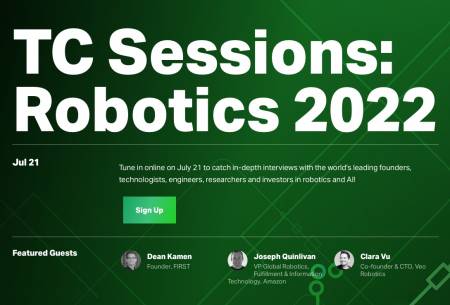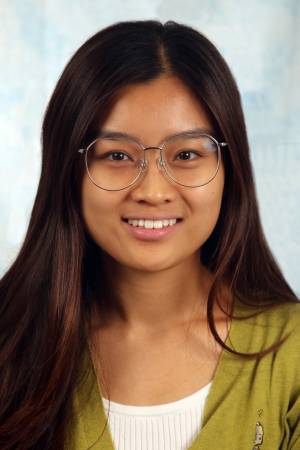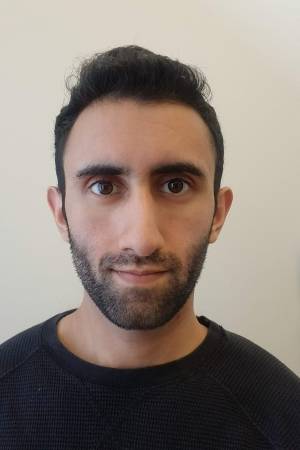Carnegie Mellon University
Liquid Metal Actuators
Abstract: This thesis contributes to the field of soft actuators by introducing a generalized framework of actuators from liquid metals. The evolution of robotic actuators has enabled robots to achieve a diversity of motions. Like natural muscles, which converts chemical energy into mechanical work in response to electrical stimuli from the nervous system, actuators are [...]
Continual Robot Learning: Benchmarks and Modular Methods
Zoom Meeting Passcode: 841755 Abstract: The earliest reinforcement learning models were designed to learn one task, specified up-front. However, an agent operating freely in the real world will not in general be granted this luxury, as the demands placed on the agent may change as environments or goals change. We refer to this ever-shifting scenario [...]
Carnegie Mellon University
MSR Thesis Talk: Yash Oza
Title: Preprocessing-based Methods for Robotic Manipulation Abstract: Robotic manipulation is a key problem for several applications such as welding, pick-and-place, and automated assembly. However, motion planning for manipulation can be computationally expensive as it requires planning in the high-dimensional configuration space of the manipulator. Additionally, task-specific constraints such as strict time limits or constraints on end-effector [...]
Five Traps for Robots in Human Environments….And How to Avoid Them
Abstract: Robotics today is moving beyond fixed environments and into human spaces like homes, restaurants, and hospitals. In these new spaces, robots will necessarily have to interact with people. In some sense, every recent robotics problem is partly a human-robot interaction problem. Thus, the field of HRI can offer insights to the broader robotics community [...]
MSR Thesis Talk: Ingrid Navarro Anaya
Title: Socially-Aware Trajectory Prediction Guided by Motion Patterns Abstract: As intelligent robots across domains start collaborating with humans in shared environments, e.g., urban settings and terminal airspace, algorithms that enable them to reason over human motion and intent are important to enable seamless and safe interplay. In our work, we study human intent by focusing on the [...]
Carnegie Mellon University
MSR Thesis Talk: Qichen Fu
Date: Tuesday, July 19, 2022 Time: 9:00 AM - 10:00 AM ET Location: Newell-Simon Hall (NSH) 3305 Title: Detect Active Object in a Sequential Voting Process Abstract: A key component of understanding hand-object interactions is the ability to identify the active object -- the object that is being manipulated by the human hand. In order to accurately localize the [...]
Carnegie Mellon University
MSR Thesis Talk: Ruohai Ge
Title: Real-Time Visual Localization System in Changing and Challenging Environments via Visual Place Recognition Abstract: Localization is one of the fundamental capabilities to guarantee reliable robot autonomy. Many excellent Visual-Inertial and LiDAR-based algorithms have been developed to solve the localization problem. However, deploying these methods on a real-time portable device is challenging due to high [...]
TechCrunch Sessions: Robotics 2022
Matt Johnson-Roberson will be one of the featured speakers in TC Sessions: Robotics 2022 on Thursday, July 21. You can register and stream for free! From the TechCrunch event site: Where Minds Meet Machines: The Future of Robotics Rapid advances in robotics technology continue to change the way businesses compete — and how people work [...]
Carnegie Mellon University
MSR Thesis Talk – Zixuan Huang
Title: Seeing the Unseen: Closed-loop Occlusion Reasoning for Cloth Manipulation Robotic manipulation of cloth remains challenging due to the complex dynamics of cloth, lack of a low-dimensional state representation, and self-occlusions. Particularly, self-occlusion makes it difficult to estimate the full state of the cloth, which poses significant challenges to policy learning and dynamics modeling. Ideally, [...]
Carnegie Mellon University
MSR Thesis Talk – Zhaoyuan Fang
Title: Features in Extra Dimensions: Spatial and Temporal Scene Representations Abstract: Computer vision models have made great progress in featurizing pixels of images. However, an image is only a projection of the actual 3D scene: occlusions and perspective distortions exist. To arrive at a better representation of the scene itself, extra dimensions are needed to [...]
Carnegie Mellon University
MSR Thesis Talk – Yunchu Zhang
Title: Library of behaviors and tools for robot manipulation Abstract: Learned policies often fail to generalize across environment variations, such as, different objects, object arrangements, or camera viewpoints. Moreover, most policies are trained and tested in simulation environments, and the sim2real gap remains large under weak visual representations that do not disentangle the scene from [...]
Carnegie Mellon University
Learning Structured World Model for Deformable Object Manipulation
Abstract: Manipulation of deformable objects challenges common assumptions in robotic manipulation, such as low-dimension state representation, known dynamics, and minimal occlusion. Deformable objects have high intrinsic state representation, complex dynamics with high degrees of freedom, and severe self-occlusion. These properties make them difficult for state estimation and planning. In this thesis, we introduce benchmarks and [...]
Safe control under input limits with neural CBF
Abstract: In theory, control barrier functions (CBFs) provide a convenient means to construct provably safe controllers. However, a typical problem is that the constructed controller will exceed input limits, and merely clipping the inputs will break all safety guarantees. To address this practical flaw, we consider synthesizing a CBF that will respect input limits. We [...]
Carnegie Mellon University
MSR Thesis Talk – Chi Yen Lee
Title: Enhancing Quadruped Locomotion Stability with Reaction Wheel Systems and Model Predictive Control Zoom: https://cmu.zoom.us/j/96808397411?pwd=YnFDaFk1WVVyZjc5UndlOTBZL0tjUT09 Abstract: The development of quadruped robots offers a mobility solution that allows robot agents to navigate complicated terrains, making them extremely versatile robots in a variety of environments. Today, there are a number of research challenges facing quadruped development. First, the [...]
MSR Thesis Talk – Chu Er Pan
Title: 6D Object Pose Estimation for Manipulation via Weak Supervision Abstract: 6D object pose estimation is essential for robotic manipulation tasks. Existing learning-based pose estimators often rely on training from labeled absolute poses with fixed object canonical frames, which (1) requires datasets with annotations of object absolute pose that are resource-intensive to collect; (2) is hard [...]
Carnegie Mellon University
MSR Thesis Talk: Ruoyang Xu
Title: Using 3D Imaging Radar for Indoor Localization and Mapping Zoom: https://cmu.zoom.us/j/95090884062?pwd=dVZDVHJDTGVUWW9iSlJLTWtidThBUT09 Meeting ID: 950 9088 4062 Passcode: 411959 Abstract: 3D Imaging Radars offer robust perception capability through visually demanding environments due to the unique penetrative and reflective properties of millimeter waves. However, the utilization of Imaging radar for robot navigation and mapping remains under-explored due [...]
Carnegie Mellon University
MSR Thesis Talk: Gaurav Pathak
Title: Programmable light curtains for Safety Envelopes, SLAM and Navigation Abstract: Conventional robot perception and navigation pipelines are built using traditional sensors such as RGB cameras, stereo depth sensors and LiDARs.These sensors scan the entire scene in a fixed and uniform way. In contrast, programmable light curtains are a recently-invented, resource-efficient sensor that measure the [...]
Carnegie Mellon University
MSR Thesis Talk: Andrew VanOsten
Title: Lidar-Visual-Inertial Odometry via Modifications and Improvements to Super Odometry Abstract: The main focus of this thesis involves improvements and extensions to Super Odometry, a preexisting method for lidar-inertial odometry. This was done in the context of the DARPA RACER program as a member of Carnegie Mellon's DEAD Fast team, aiming to provide reliable [...]
Carnegie Mellon University
MSR Thesis Talk – Bassam Bikdash
Title: Boundary-Aware Demons Algorithm with Applications in Electronic Waste Recycling Abstract Electronic waste (e-waste) refers to electronic devices that are nearing the end of their useful life, and are discarded, donated, or given away. Valuable metallic and plastic components in e-waste (gold, silver, platinum) is estimated to value upwards of $60 billion and although e-waste represents [...]
Carnegie Mellon University
MSR Thesis Talk – Mary Hatfalvi
Title: Introspective Perception through Identifying Blur, Light Direction, and Angle-of-View Abstract Robotic perception tasks have achieved great performance, especially in autonomous vehicles and robot assistance. However, we still often do not understand how and when perception tasks fail. Researchers have achieved some success in creating introspective perception systems that detect when perception tasks will fail, [...]
Carnegie Mellon University
MSR Thesis Talk: Bowei Chen
Title: Image Synthesis with Appearance Decomposition Abstract: Our visual world is compositional and its appearance can be decomposed into various components. Leveraging these components can be beneficial for challenging image synthesis tasks. To this end, this thesis focuses on studying how appearance decomposition can improve image synthesis methods using two examples. (1) Structural decomposition: we introduce [...]
MSR Thesis Talk: Ivan Cisneros
Title: A VPR-Based Technique for UAV Localization In Unseen Environments Abstract: Unmanned Aerial Vehicles (UAVs) primarily rely on GPS-assisted localization and navigation due to the accessibility and ubiquity of such systems. However, this presents a potentially catastrophic single point of failure that may prevent autonomous UAVs from becoming truly reliable, as GPS is prone to dropout, [...]
MSR Thesis Talk: Yehonathan Litman
Title: GPS-Denied Global Visual-Inertial Ground Vehicle State Estimation via Image Registration Abstract: Robotic systems such as unmanned ground vehicles (UGVs) often depend on GPS for navigation in outdoor environments. In GPS-denied environments, one approach to maintain a global state estimate is localizing based on preexisting georeferenced aerial or satellite imagery. However, this is inherently challenged [...]
Carnegie Mellon University
MSR Thesis Talk – George Cazenavette
Title: Learning to Distill Datasets by Matching Expert Training Trajectories Project Page: https://georgecazenavette.github.io/mtt-distillation/ Abstract: Dataset distillation is the task of synthesizing a small dataset such that a model trained on the synthetic set will match the test accuracy of the model trained on the full dataset. In this talk, we review 3 several of our recent [...]
Carnegie Mellon University
MSR Thesis Talk – Zongyue Zhao
Title: Coordinating Heterogeneous Teams for Urban Search and Rescue Abstract: The mission of Urban Search and Rescue (USAR) has drawn significant interest in robotics. Autonomous entities must be able to share knowledge efficiently to address visibility and collaboration challenges in a complex environment shortly after structural collapse catastrophes. In this thesis, we present methods to coordinate [...]
Carnegie Mellon University
MSR Thesis Talk – Jeff Hu
Title: Composition Learning in “Modular” Robot Systems Abstract: Modular robot and multi-robot systems share a concept in common: composition, i.e. the study of how parts can be combined so they can be used to achieve certain objectives. Our vision is to enable robotic systems to configure and reconfigure themselves during field deployment, either autonomously or [...]
Carnegie Mellon University
MSR Thesis Talk – Tom Bu
Title: Towards HD Map Updates With Crosswalk Change Detection From Vehicle-mounted Cameras Zoom: https://cmu.zoom.us/j/4452379705 Abstract: Many autonomous vehicles rely on high-definition maps that contain road layout and road semantics as priors for perception, planning and prediction. However, these maps can become stale over time as the road environment changes. This thesis develops a road monitoring framework [...]
MSR Thesis Talk: Zilin Si
Title: Taxim: An Example-based Simulation Model for GelSight Tactile Sensors and its Sim-to-Real Applications Location: NSH 4305 or Zoom https://cmu.zoom.us/j/91769761787?pwd=cGZ2RElKMVJaQ1NVNG5BdFQ0Ny9uQT09 Abstract: Simulation is widely used in robotics for system verification and large-scale data collection. However, simulating a robot system efficiently and with high fidelity, from sensing, perception to manipulation, has been a long-standing challenge. Tactile sensing, as [...]
Carnegie Mellon University
MSR Thesis Talk – Benjamin Jensen
Title: A Low-Cost Attitude Determination and Control System and Hardware-in-the-Loop Testbed for CubeSats Zoom: https://cmu.zoom.us/j/92654622790?pwd=d0pYcTJ4K0xzdmYvUHFYWC9lMDBhQT09 Abstract: Since their initial development in the late 1990s, CubeSats have quickly grown popular due to their relatively low cost and short development period. However, CubeSat launches are prone to failure, with less than half of CubeSats completely fulfilling their [...]
Carnegie Mellon University
MSR Thesis Talk – Swapnil Pande
Title: Driving by Dreaming: Offline Model-Based Reinforcement Learning for Motion Planning for Autonomous Vehicles Abstract: While there has been significant progress in deploying autonomous vehicles (AVs) in urban driving settings, there remains a long-tail of challenging motion planning scenarios that must be addressed before truly driverless operation is possible. The current paradigm for motion planner [...]
Carnegie Mellon University
MSR Thesis Talk – Alvin Shek
Title: Learning from Physical Human Feedback: An Object-Centric One-Shot Adaptation Method Abstract: For robots to be effectively deployed in novel environments and tasks, they must be able to understand the feedback expressed by humans during intervention. This can either correct undesirable behavior or indicate additional preferences. Existing methods either require repeated episodes of interactions or [...]
Carnegie Mellon University
MSR Thesis Talk: Jiaqi Geng
Title: Dense Human Pose Estimation From WiFi Abstract: Advances in computer vision and machine learning techniques have led to significant development in 2D and 3D human pose estimation from RGB cameras, LiDAR, and radars. However, human pose estimation from images is adversely affected by occlusion and lighting, which are common in many scenarios of interest. [...]
Carnegie Mellon University
MSR Thesis Talk: Jianchun Chen
Title: An efficient approach for sequential shape human performance capture from monocular video Abstract: Human performance capture from RGB videos in unconstrained environments has become very popular for applications to generate virtual avatars or digital actors. Modern approaches rely on neural network algorithms to estimate geometry directly from images, resulting in a coarse representation of [...]
Thermal Management Considerations For Lunar Polar Micro-Rovers
Meeting ID: 940 0396 4889 Passcode: 906118 Abstract: This research addresses the significant and unprecedented challenge of thermal regulation for lunar polar micro-rovers. These are distinct from priors by way of very small size, mass, and power, but particularly for the extremes of ambient environment in which they must operate. On the lunar poles, rovers experience temperatures [...]
Carnegie Mellon University
MSR Thesis Talk: Zhihao Zhang
Title: Efficient Methods for Model Performance Inference Abstract: A key challenge in neural architecture search (NAS) is quickly inferring the predictive performance of a broad spectrum of neural networks to discover statistically accurate and computationally efficient ones. We refer to this task as model performance inference (MPI). The current practice for efficient MPI is gradient-based methods [...]
Carnegie Mellon University
MSR Thesis Talk: Chufan Gao
Title: Addressing Time-series Signal Quality in Healthcare Data Abstract: Healthcare data time-series signal quality assessment (SQA) plays a vital role in the accuracy and reliability of machine learning algorithms to analyze health metrics. However, these signals are often corrupted with different kinds of noises and artifacts, including Baseline Wander, Muscle Artifacts, Powerline Interference, and Equipment Failure. This [...]
Carnegie Mellon University
Object Pose Estimation without Direct Supervision
Abstract: Currently, robot manipulation is a special purpose tool, restricted to isolated environments with a fixed set of objects. In order to make robot manipulation more general, robots need to be able to perceive and interact with a large number of objects in cluttered scenes. Traditionally, object pose has been used as a representation to [...]
Multimodal Modeling: Learning Beyond Visual Knowledge
Abstract: The computer vision community has embraced the success of learning specialist models by training with a fixed set of predetermined object categories, such as ImageNet or COCO. However, learning only from visual knowledge might hinder the flexibility and generality of visual models, which requires additional labeled data to specify any other visual concept and [...]
Improving Robotic Exploration with Self-Supervision and Diverse Data
Abstract: Reinforcement learning (RL) holds great promise for improving robotics, as it allows systems to move beyond passive learning and interact with the world while learning from these interactions. A key aspect of this interaction is exploration: which actions should an RL agent take to best learn about the world? Prior work on exploration is typically [...]
RI Faculty Business Meeting
Meeting for RI Faculty. Discussions include various department topics, policies, and procedures. Generally meets weekly.
An Extension to Model Predictive Path Integral Control and Modeling Considerations for Off-road Autonomous Driving in Complex Environment
Abstract: The ability to traverse complex environments and terrains is critical to autonomously driving off-road in a fast and safe manner. Challenges such as terrain navigation and vehicle rollover prevention become imperative due to the off-road vehicle configuration and the operating environment itself. This talk will introduce some of these challenges and the different tools [...]
RI Faculty Business Meeting
Meeting for RI Faculty. Discussions include various department topics, policies, and procedures. Generally meets weekly.
Carnegie Mellon University
Heuristic Search Based Planning by Minimizing Anticipated Search Efforts
Abstract: We focus on relatively low dimensional robot motion planning problems, such as planning for navigation of a self-driving vehicle, unmanned aerial vehicles (UAVs), and footstep planning for humanoids. In these problems, there is a need for fast planning, potentially compromising the solution quality. Often, we want to plan fast but are also interested in [...]
Robotic Cave Exploration for Search, Science, and Survey
Abstract: Robotic cave exploration has the potential to create significant societal impact through facilitating search and rescue, in the fight against antibiotic resistance (science), and via mapping (survey). But many state-of-the-art approaches for active perception and autonomy in subterranean environments rely on disparate perceptual pipelines (e.g., pose estimation, occupancy modeling, hazard detection) that process the same underlying sensor data in different [...]
Audio-Visual Learning for Social Telepresence
Abstract Relationships between people are strongly influenced by distance. Even with today’s technology, remote communication is limited to a two-dimensional audio-visual experience and lacks the availability of a shared, three-dimensional space in which people can interact with each other over the distance. Our mission at Reality Labs Research (RLR) in Pittsburgh is to develop such [...]
An autonomous navigation system that could hopefully support RI research
I will show a few videos as the key results of our research in the last several years. These results span the scope of state estimation, mapping, autonomous navigation, and exploration. While these results illustrate separate pieces of work, the underlying modules contribute to a final, integrated autonomy system in the end. I will show a simulation [...]
Combining Offline Reinforcement Learning with Stochastic Multi-Agent Planning for Autonomous Driving
Abstract: Fully autonomous vehicles have the potential to greatly reduce vehicular accidents and revolutionize how people travel and how we transport goods. Many of the major challenges for autonomous driving systems emerge from the numerous traffic situations that require complex interactions with other agents. For the foreseeable future, autonomous vehicles will have to share the [...]
Argo Poster Session
Join us for an opportunity to see what Center students have been working on. Check out an Argo AI self-driving car in person, and grab some free appetizers, soft drinks, and Argo AI swag! All are welcome to attend.
Representations in Robot Manipulation: Learning to Manipulate Ropes, Fabrics, Bags, and Liquids
Abstract: The robotics community has seen significant progress in applying machine learning for robot manipulation. However, much manipulation research focuses on rigid objects instead of highly deformable objects such as ropes, fabrics, bags, and liquids, which pose challenges due to their complex configuration spaces, dynamics, and self-occlusions. To achieve greater progress in robot manipulation of [...]
Human-to-Robot Imitation in the Wild
Abstract: In this talk, I approach the problem of learning by watching humans in the wild. While traditional approaches in Imitation and Reinforcement Learning are promising for learning in the real world, they are either sample inefficient or are constrained to lab settings. Meanwhile, there has been a lot of success in processing passive, unstructured human [...]
Safe and Stable Learning for Agile Robots without Reinforcement Learning
Abstract: My research group (https://aerospacerobotics.caltech.edu/) is working to systematically leverage AI and Machine Learning techniques towards achieving safe and stable autonomy of safety-critical robotic systems, such as robot swarms and autonomous flying cars. Another example is LEONARDO, the world's first bipedal robot that can walk, fly, slackline, and skateboard. Stability and safety are often research problems [...]
Towards editable indoor lighting estimation
Abstract: Combining virtual and real visual elements into a single, realistic image requires the accurate estimation of the lighting conditions of the real scene. In recent years, several approaches of increasing complexity---ranging from simple encoder-decoder architecture to more sophisticated volumetric neural rendering---have been proposed. While the quality of automatic estimates has increased, they have the unfortunate downside [...]
Causal Robot Learning for Manipulation
Abstract: Two decades into the third age of AI, the rise of deep learning has yielded two seemingly disparate realities. In one, massive accomplishments have been achieved in deep reinforcement learning, protein folding, and large language models. Yet, in the other, the promises of deep learning to empower robots that operate robustly in real-world environments [...]
RI Faculty Business Meeting
Meeting for RI Faculty. Discussions include various department topics, policies, and procedures. Generally meets weekly.
Computational imaging with multiply scattered photons
Abstract: Computational imaging has advanced to a point where the next significant milestone is to image in the presence of multiply-scattered light. Though traditionally treated as noise, multiply-scattered light carries information that can enable previously impossible imaging capabilities, such as imaging around corners and deep inside tissue. The combinatorial complexity of multiply-scattered light transport makes [...]
Dense Reconstruction of Dynamic Structures from Monocular RGB Videos
Abstract: We study the problem of 3D reconstruction of {\em generic} and {\em deformable} objects and scenes from {\em casually-taken} RGB videos, to create a system for capturing the dynamic 3D world. Being able to reconstruct dynamic structures from casual videos allows one to create avatars and motion references for arbitrary objects without specialized devices, [...]
Differentiable Collision Detection
Abstract: Collision detection between objects is critical for simulation, control, and learning for robotic systems. However, existing collision detection routines are inherently non-differentiable, limiting their applications in gradient-based optimization tools. In this talk, I present DCOL: a fast and fully differentiable collision-detection framework that reasons about collisions between a set of composable and highly expressive [...]
Towards $1 robots
Abstract: Robots are pretty great -- they can make some hard tasks easy, some dangerous tasks safe, or some unthinkable tasks possible. And they're just plain fun to boot. But how many robots have you interacted with recently? And where do you think that puts you compared to the rest of the world's people? In [...]
Mental models for 3D modeling and generation
Abstract: Humans have extraordinary capabilities of comprehending and reasoning about our 3D visual world. One particular reason is that when looking at an object or a scene, not only can we see the visible surface, but we can also hallucinate the invisible parts - the amodal structure, appearance, affordance, etc. We have accumulated thousands of [...]
On Interaction, Imitation, and Causation
Abstract: A standard critique of machine learning models (especially neural networks) is that they pick up on spurious correlations rather than causal relationships and are therefore brittle in the face of distribution shift. Solving this problem in full generality is impossible (i.e. there might be no good way to distinguish between the two). However, if [...]
Learning via Visual-Tactile Interaction
Abstract: Humans learn by interacting with their surroundings using all of their senses. The first of these senses to develop is touch, and it is the first way that young humans explore their environment, learn about objects, and tune their cost functions (via pain or treats). Yet, robots are often denied this highly informative and [...]
Carnegie Mellon University
Accelerating Numerical Methods for Optimal Control
Abstract: Many modern control methods, such as model-predictive control, rely heavily on solving optimization problems in real time. In particular, the ability to efficiently solve optimal control problems has enabled many of the recent breakthroughs in achieving highly dynamic behaviors for complex robotic systems. The high computational requirements of these algorithms demand novel algorithms tailor-suited [...]
Tactile SLAM: perception for dexterity via vision-based touch
Abstract: Touch provides a direct window into robot-object interaction, free from occlusion and aliasing faced by visual sensing. Collated tactile perception can facilitate contact-rich tasks---like in-hand manipulation, sliding, and grasping. Here, online estimates of object geometry and pose are crucial for downstream planning and control. With significant advances in tactile sensing, like vision-based touch, a [...]
RI Faculty Business Meeting
Meeting for RI Faculty. Discussions include various department topics, policies, and procedures. Generally meets weekly.
Resource Allocation for Learning in Robotics
Abstract: Robots operating in the real world need fast and intelligent decision making systems. While these systems have traditionally consisted of human-engineered behaviors and world models, there has been a lot of interest in integrating them with data-driven components to achieve faster execution and reduce hand-engineering. Unfortunately, these learning-based methods require large amounts of training [...]
What (else) can you do with a robotics degree?
Abstract: In 2004, half-way through my robotics Ph.D., I had a panic-inducing thought: What if I don’t want to build robots for the rest of my life? What can I do with this degree?! Nearly twenty years later, I have some answers: tackle climate change in Latin America, educate Congress about autonomous vehicles, improve how [...]
Complete Codec Telepresence
Abstract: Imagine two people, each of them within their own home, being able to communicate and interact virtually with each other as if they are both present in the same shared physical space. Enabling such an experience, i.e., building a telepresence system that is indistinguishable from reality, is one of the goals of Reality Labs [...]
R.I.P ohyay: experiences building online virtual experiences during the pandemic: what works, what hasn’t, and what we need in the future
Abstract: During the pandemic I helped design ohyay (https://ohyay.co), a creative tool for making and hosting highly customized video-based virtual events. Since Fall 2020 I have personally designed many online events: ranging from classroom activities (lectures, small group work, poster sessions, technical papers PC meetings), to conferences, to virtual offices, to holiday parties involving 100's [...]
Planning with Dynamics by Interleaving Search and Trajectory Optimization
Abstract: Search-based planning algorithms enable autonomous agents like robots to come up with well-reasoned long-horizon plans to achieve a given task objective. They do so by searching over the graph that results from discretizing the state and action space. However, in robotics, several dynamically rich tasks require high-dimensional planning in the continuous space. For such [...]
Physics-informed image translation
Abstract: Generative Adversarial Networks (GANs) have shown remarkable performances in image translation, being able to map source input images to target domains (e.g. from male to female, day to night, etc.). However, their performances may be limited by insufficient supervision, which may be challenging to obtain. In this talk, I will present our recent works [...]
Robots Should Reduce, Reuse, and Recycle
Abstract: Despite numerous successes in deep robotic learning over the past decade, the generalization and versatility of robots across environments and tasks has remained a major challenge. This is because much of reinforcement and imitation learning research trains agents from scratch in a single or a few environments, training special-purpose policies from special-purpose datasets. In [...]
Solving Constraint Tasks with Memory-Based Learning
Abstract: In constraint tasks, the current task state heavily limits what actions are available to an agent. Mechanical constraints exist in many common tasks such as construction, disassembly, and rearrangement and task space constraints exist in an even broader range of tasks. Deep reinforcement learning algorithms have typically struggled with constraint tasks for two main [...]
Weak Multi-modal Supervision for Object Detection and Persuasive Media
Abstract: The diversity of visual content available on the web presents new challenges and opportunities for computer vision models. In this talk, I present our work on learning object detection models from potentially noisy multi-modal data, retrieving complementary content across modalities, transferring reasoning models across dataset boundaries, and recognizing objects in non-photorealistic media. While the [...]
Head-Worn Assistive Teleoperation of Mobile Manipulators
Abstract: Mobile manipulators in the home can provide increased autonomy to individuals with severe motor impairments, who often cannot complete activities of daily living (ADLs) without the help of a caregiver. Teleoperation of an assistive mobile manipulator could enable an individual with motor impairments to independently perform self-care and household tasks, yet limited motor function [...]
Text Classification with Class Descriptions Only
Abstract: In this work, we introduce KeyClass, a weakly-supervised text classification framework that learns from class-label descriptions only, without the need to use any human-labeled documents. It leverages the linguistic domain knowledge stored within pre-trained language models and data programming to automatically label documents. We demonstrate its efficacy and flexibility by comparing it to state-of-the-art [...]
RI Faculty Business Meeting
Meeting for RI Faculty. Discussions include various department topics, policies, and procedures. Generally meets weekly.
Multi-Object Tracking in the Crowd
Abstract: In this talk, I will focus on the problem of multi-object tracking in crowded scenes. Tracking within crowds is particularly challenging due to heavy occlusion and frequent crossover between tracking targets. The problem becomes more difficult when we only have noisy bounding boxes due to background and neighboring objects. Existing tracking methods try to [...]
Utilizing Panoptic Segmentation and a Locally-Conditioned Neural Representation to Build Richer 3D Maps
Abstract: Advances in deep-learning based perception and maturation of volumetric RGB-D mapping algorithms have allowed autonomous robots to be deployed in increasingly complex environments. For robust operation in open-world conditions however, perceptual capabilities are still lacking. Limitations of commodity depth sensors mean that complex geometries and textures cannot be reconstructed accurately. Semantic understanding is still [...]
NREC Study Group & Recent Projects
This talk will describe the NREC study process that has been developed as a lower cost of entry work product for potential partners. This is a process that is available for anyone on campus that wants to help their sponsors create viable system concepts and potential development costs before committing to a full development program. [...]
Machine Learning and Model Predictive Control for Adaptive Robotic Systems
Abstract: In this talk I will discuss several different ways in which ideas from machine learning and model predictive control (MPC) can be combined to build intelligent, adaptive robotic systems. I’ll begin by showing how to learn models for MPC that perform well on a given control task. Next, I’ll introduce an online learning perspective on [...]
Magnification-invariant retinal distance estimation using a laser aiming beam
Abstract: Retinal surgery procedures like epiretinal membrane peeling and retinal vein cannulation require surgeons to manipulate very delicate structures in the eye with little room for error. Many robotic surgery systems have been developed to help surgeons and enforce safeguards during these demanding procedures. One essential piece of information that is required to create and [...]
Towards more effective remote execution of exploration operations using multimodal interfaces
Abstract: Remote robots enable humans to explore and interact with environments while keeping them safe from existing harsh conditions (e.g., in search and rescue, deep sea or planetary exploration scenarios). However, the gap between the control station and the remote robot presents several challenges (e.g., situation awareness, cognitive load, perception, latency) for effective teleoperation. Multimodal [...]
Bridging Humans and Generative Models
Abstract: Deep generative models make visual content creation more accessible to novice and professional users alike by automating the synthesis of diverse, realistic content based on a collected dataset. People often use generative models as data-driven sources, making it challenging to personalize a model easily. Currently, personalizing a model requires careful data curation, which is [...]
Learning Visual, Audio, and Cross-Modal Correspondences
Abstract: Today's machine perception systems rely heavily on supervision provided by humans, such as labels and natural language. I will talk about our efforts to make systems that, instead, learn from two ubiquitous sources of unlabeled data: visual motion and cross-modal sensory associations. I will begin by discussing our work on creating unified models for [...]
Impulse considerations for reasoning about intermittent contacts
Abstract: Many of our interactions with the environment involve making and breaking contacts. However, it is not always obvious how one should reason about these intermittent contacts (sequence, timings, locations) in an online and adaptive way. This is particularly relevant in gait generation for legged locomotion control, where it is standard to simply predefine and [...]
Multi-Human 3D Reconstruction from Monocular RGB Videos
Abstract: We study the problem of multi-human 3D reconstruction from RGB videos captured in the wild. Humans have dynamic motion, and reconstructing them in arbitrary settings is key to building immersive social telepresence, assistive humanoid robots, and augmented reality systems. However, creating such a system requires addressing fundamental issues with previous works regarding the data [...]
Learning and Translating Temporal Abstractions across Humans and Robots
Abstract: Humans possess a remarkable ability to learn to perform tasks from a variety of different sources-from language, instructions, demonstration, etc. In each case, they are able to easily extract the high-level strategy to solve the task, such as the recipe of cooking a dish, whilst ignoring irrelevant details, such as the precise shape of [...]
Robust Incremental Smoothing and Mapping
Abstract: In this work we present a method for robust optimization for online incremental Simultaneous Localization and Mapping (SLAM). Due to the NP-Hardness of data association in the presence of perceptual aliasing, tractable (approximate) approaches to data association will produce erroneous measurements. We require SLAM back-ends that can converge to accurate solutions in the presence [...]
Carnegie Mellon University
3D Reconstruction using Differential Imaging
Abstract: 3D reconstruction has been at the core of many computer vision applications, including autonomous driving, visual inspection in manufacturing, and augmented and virtual reality (AR/VR). Because monocular 3D sensing is fundamentally ill-posed, many techniques aiming for accurate reconstruction use multiple captures to solve the inverse problem. Depending on the amount of change in these [...]
Learning with Structured Priors for Robust Robot Manipulation
Abstract: Robust and generalizable robots that can autonomously manipulate objects in semi-structured environments can bring material benefits to society. Data-driven learning approaches are crucial for enabling such systems by identifying and exploiting patterns in semi-structured environments, allowing robots to adapt to novel scenarios with minimal human supervision. However, despite significant prior work in learning for [...]
Learning Parameter-Efficient Quadrotor Dynamics Models
Abstract: Operation of quadrotors through high-speed, high-acceleration maneuvers remains a challenging problem due to the complex aerodynamics in this regime. While standard physical models suffice for control in near-hover conditions, the primary challenge in executing aggressive trajectories is obtaining a model for the quadrotor dynamics that adequately models the aerodynamic effects present, including lift, drag, [...]
RI Faculty Business Meeting
Meeting for RI Faculty. Discussions include various department topics, policies, and procedures. Generally meets weekly.
Carnegie Mellon University
Self-Supervising Occlusions For Vision
Abstract: Virtually every scene has occlusions. Even a scene with a single object exhibits self-occlusions - a camera can only view one side of an object (left or right, front or back), or part of the object is outside the field of view. More complex occlusions occur when one or more objects block part(s) of [...]






















































